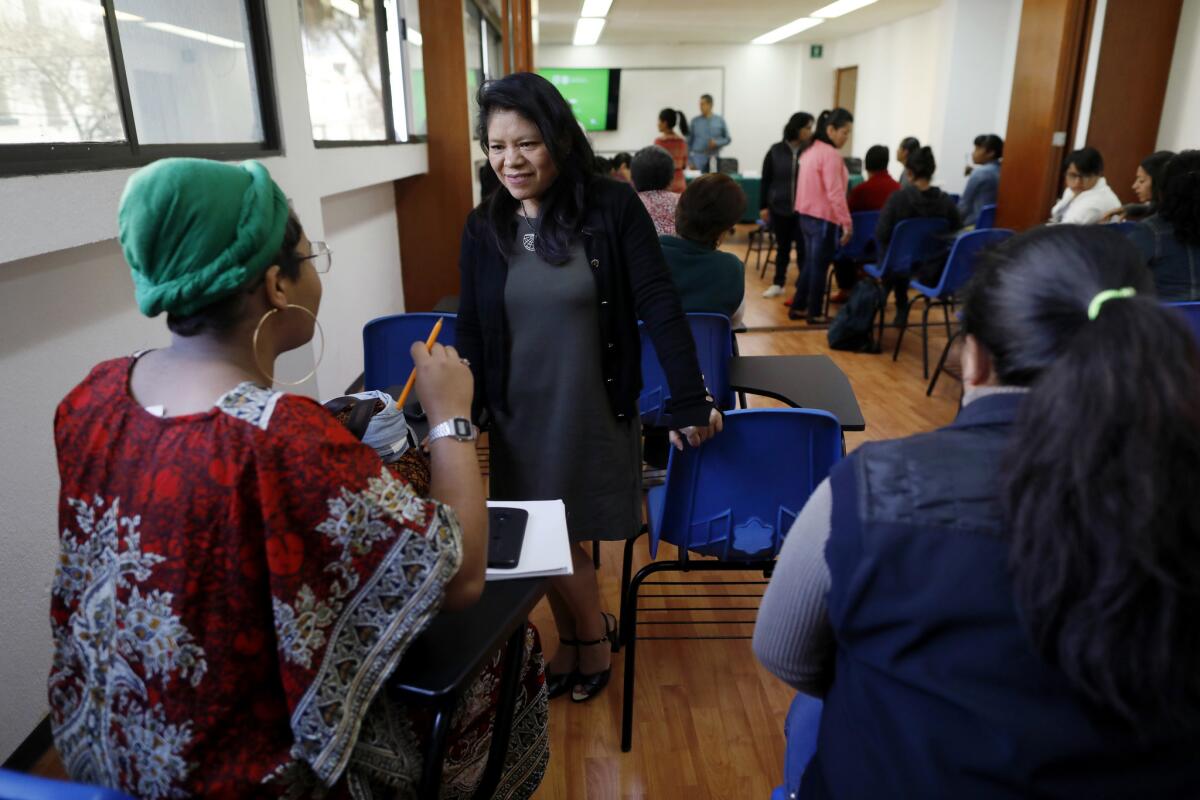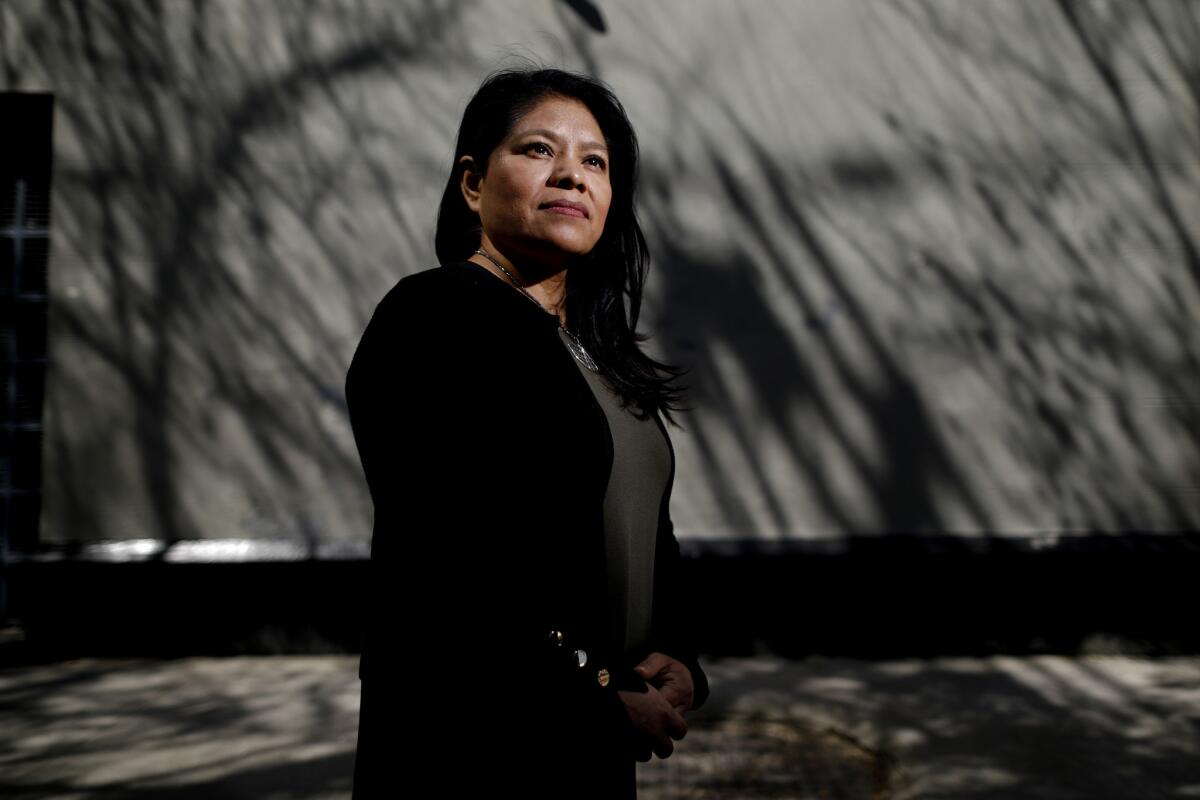Like the main character in ‘Roma,’ she worked in homes for decades. Now she’s fighting for domestic workers

- Share via
Reporting from Mexico City — Marcelina Bautista wept the first time she watched “Roma,” the Oscar-nominated drama about a domestic worker’s complicated relationship with the family that employs her.
It felt so familiar.
For the record:
2:10 p.m. Feb. 20, 2019A previous version of this story misspelled part of Mexican President Andrés Manuel López Obrador’s name as Manual.
Like Cleo, the film’s protagonist, Bautista had spent years living in other people’s homes, cooking their meals, cleaning up their messes and caring for their kids. Like Cleo, she often felt pangs of isolation and had at times suffered discrimination and abuse.
But unlike Cleo, Bautista fought back. Three decades ago, she began quietly organizing workers like her in a park on the north side of Mexico City and in 2000 created a group that would eventually spawn Mexico’s first-ever trade union for domestic workers.
The union’s demands are simple: That the 2.4 million Mexicans who work in private homes be treated as formal employees, protected from abuse by federal labor laws and given contracts that ensure fair wages, limited working hours and paid vacations.
The movement has won major gains in recent months. In December, Mexico’s Supreme Court ruled that domestic workers have a right to receive social security benefits. Mexico’s Senate, which is controlled by the leftist party of President Andres Manuel López Obrador, recently introduced legislation that would add protections for domestic workers.
And then there is the cultural moment spawned by “Roma,” which has drawn new attention to the plight of domestic workers in Mexico while sparking difficult discussions about class and race.
The film’s writer and director, Alfonso Cuaron, has encouraged those discussions. He asked Bautista to introduce the movie at its December premiere, and this month teamed up with Bautista for an online video that explains a recent Supreme Court decision, which eventually will require people who employ domestic workers to pay into the country’s social security system.
Cuaron, whose film is based loosely on his own childhood relationship with his family’s live-in nanny, gave the union the rights to use the movie to help its cause. Bautista has toured the country with it in recent months, spreading the group’s message at each screening.
Explaining the film to members of the anti-poverty organization CARE International in a Mexico City theater on a recent morning, Bautista said conditions for domestic workers today are similar to those portrayed in the film, which is set in the 1970s. The jobs are typically so low-paid that even middle-class families can afford hired help.
The difference now, she said, is a growing awareness that things must change.
“Cleo didn’t know her rights,” Bautista said. “I do.”

Bautista was 14 when she left her pueblo of 500 people in the state of Oaxaca to find work in Mexico’s bustling capital, where she walked the streets until she found a sign that said: “Looking for a servant.”
She had dreamed of becoming a lawyer, but her parents had 12 children and couldn’t afford to pay for studies.
She spoke only her indigenous Mixtec when she arrived in Mexico City and learned Spanish from the children she cared for at her first job. The children’s mother hit her because she didn’t know how to use a washing machine and paid her less than the minimum wage, she said.
Other workers had it much worse. Some suffered sexual abuse or were essentially trapped in indentured servitude, earning little or no money because their employers said that providing food and housing was fair compensation.
The majority of Mexico’s domestic workers are indigenous women who never completed middle school, according to labor officials.
One in three is paid less than the minimum wage of about $5 a day. Nine in 10 work without having ever signed formal contracts.
For those living with employers, it is typical to work 12 hours or more each day with just one or two days off each month. It was on those rare days off, typically Sundays, that Bautista began organizing workers at the park many years ago with the support of a local Catholic church.
One of the first things Bautista did was poll the women on what they wanted to be called. They said they didn’t want to be referred to as “servant” or “muchacha,” the Spanish word for girl. They wanted to be called “trabajadoras,” or “workers,” and they wanted to be treated fairly.
It was a bold proposal in Mexico, where many regard housekeeping and child rearing as “women’s work,” not formal labor, and where maids and babysitters are sometimes referred to as “part of the family,” even while they are treated as second-class citizens within the home.
Bautista, who put herself through school while working full time, said her efforts to empower workers drew suspicion among some.
“You’re turning the workers against us,” one employer complained.
“They told us you were the guerrilla,” said another.
The proliferation of smartphones has been essential in organizing workers who are spread around the country.
Norma Palacio Trabamau, 45, stumbled upon a link for Bautista’s group while searching the internet for jobs. At the first meeting she attended — a training session for workers — she felt a thrill when the other women greeted her as “companera,” or “colleague.”
“I realized I had arrived at a place where I mattered,” she said.

Palacio’s parents had been domestic workers — her mother a housekeeper, her father a gardener. They had worked for a single family for years before being fired in old age, finding themselves with no pension or other savings for retirement. Palacio had wanted to study but had to get a job to help support them.
Employers, she said, often sent mixed messages. One boss invited her to join the family for dinner, but then served Palacio food on plastic children’s dishware while the family ate on china.
Palacio, who is now the general secretary of the union, called Bautista a hero.
“None of us would be here without her,” she said. “She opened this space.”
“Roma” has only widened it.
The film has revealed racism in Mexico, where a light-skinned actor was recently caught on video calling “Roma” star Yalitza Aparicio a slur used to demean indigenous people. But it has also opened doors.
“I am Marcelina Bautista and I am probably the first-ever domestic worker to publish a column in a national newspaper,” began an essay she recently wrote for El Universal.
After 22 years working in homes, Bautista now focuses full time on promoting the union’s efforts and on expanding the movement to other parts of Latin America. Her life has been a whirlwind of nonstop travel and interviews since the film was released on Netflix in November.
She has shown the film to university students, domestic workers and lawmakers.
At a screening late last year in the Mexican Senate, Bautista paused before starting the movie. First, she said, the politicians would have to pledge their support for her cause.
Envelope Live screening series: ‘Roma’


'Roma' actresses talk about the stigma surrounding failed marriages

How 'Roma' has inspired surprising reactions from male viewers

'Roma' stars on why it helped not to have a full script

'Roma': The story behind that pivotal beach scene

'Roma' stars discuss the real women who inspired their characters
Twitter: @katelinthicum
More to Read
Sign up for Essential California
The most important California stories and recommendations in your inbox every morning.
You may occasionally receive promotional content from the Los Angeles Times.











